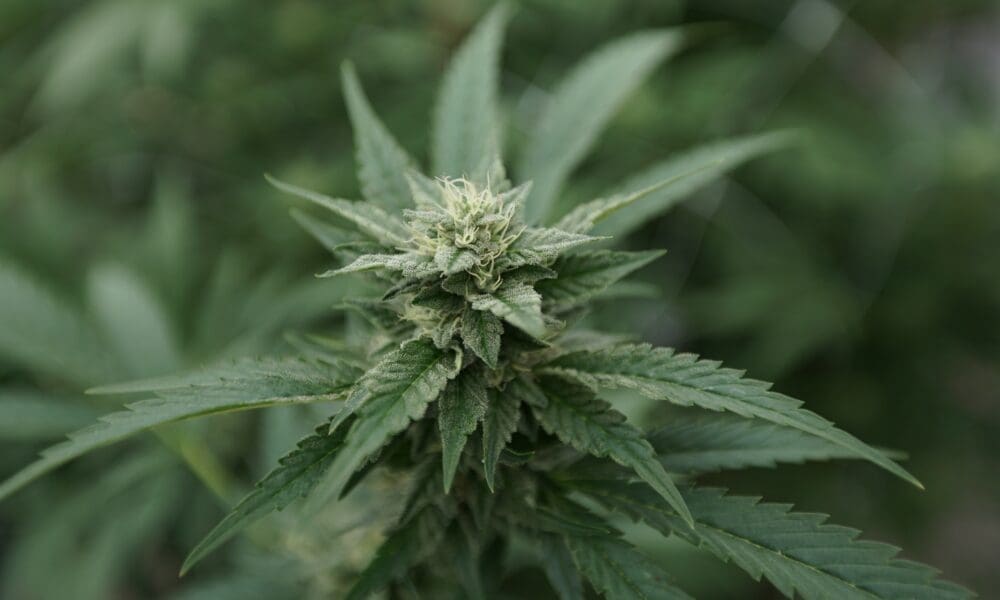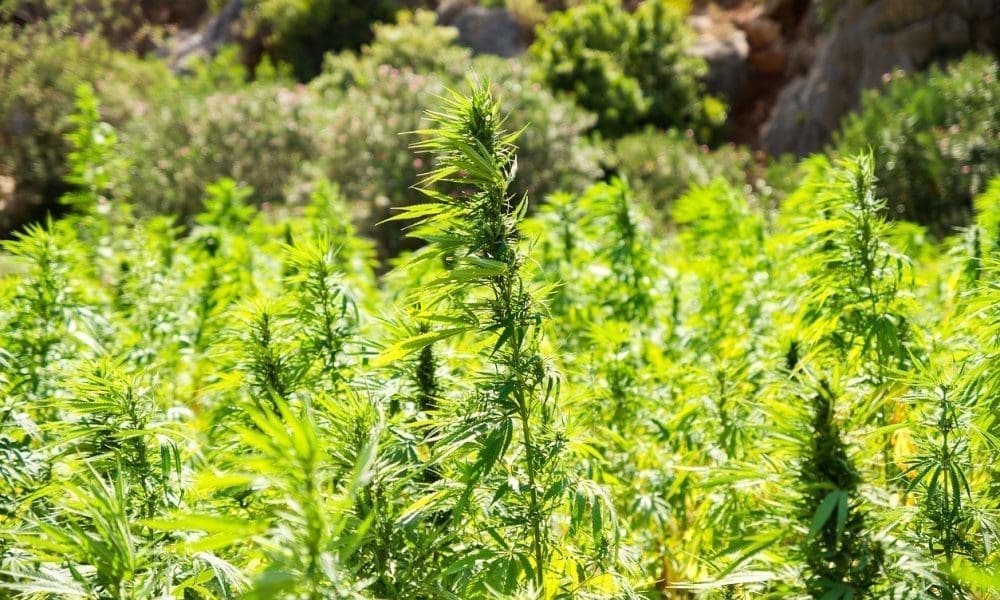featured
Iowa Lawmaker Surprised By Governor’s ‘Unexpected’ Veto Of Psilocybin Bill
Published
11 hours agoon

“I look forward to having a conversation with the Governor to learn more about her concerns regarding the bill.”
By Cami Koons, Iowa Capital Dispatch
A key lawmaker said he was surprised by Gov. Kim Reynolds’s (R) veto last week of a bill that would have allowed for the prescription and distribution of synthetic psilocybin, the psychoactive compound in “magic mushrooms” following federal approval of the drug.
Reynolds said the bill “moves ahead” of public health systems, law enforcement and regulatory systems in the state.
“This decision is not a dismissal of the emerging science or the sincere advocacy behind this legislation,” Reynolds said in her explanation of the veto. “Rather, it is a call for a more deliberate and Iowa-centric approach.”
House File 383 was one of two bills from the Iowa House this year that sought to legalize the use of psychedelics as a treatment for mental health issues, like post-traumatic stress disorder.
The bill’s floor manager, Rep. Brett Barker (R-Nevada) said the veto from the governor was “unexpected” considering the bill passed with unanimous consent in both chambers.
“I look forward to having a conversation with the Governor to learn more about her concerns regarding the bill,” Barker said in an email.
The other bill, House File 978, would have created a psilocybin licensing board in Iowa, and similar to the state’s medical marijuana program, would have allowed eligible patients access to the drug while it is still federally classified as Schedule I substance.
The bill advanced from the House but was not heard in the Senate.
HF 383, the bill put before the governor, would have immediately rescheduled any drugs containing crystalline polymorph psilocybin, the synthetic version of the compound, if they were approved for use by the U.S. Food and Drug Administration (FDA).
Under the bill and conditioned circumstances, it would be legal to prescribe, distribute and market drugs with the ingredient, which is also sometimes referred to as COMP360.
Clinical trials of COMP360 as a treatment for PTSD and treatment resistant depression have been conducted and are ongoing.
A similar bill was signed into law in Colorado in March. Colorado and Oregon are the only states with legalized medical licensing programs for psilocybin.
Reynolds said she does “recognize and respect the growing body of research into the potential therapeutic benefits of psilocybin” but she said the compound should be approved by FDA and the Drug Enforcement Agency before Iowa acts to reschedule.
“The pathway provided by this bill for legalization of psilocybin at the state level before we have a chance to review federal action…creates legal uncertainty, poses risks for misuse and could undermine broader efforts to ensure safe and effective therapeutic use in the future,” Reynolds said.
This story was first published by Iowa Capital Dispatch.
Psychedelic Therapy Can Help Reduce Problematic Alcohol And Tobacco Use, Scientific Review Shows

Author: mscannabiz.com
MScannaBIZ for all you Mississippi Cannabis News and Information.
You may like
-
Access Denied
-


Lawmakers Could Reschedule Marijuana With ‘Greater Speed And Flexibility’ Than Administration Officials, Congressional Researchers Say
-


Aurora Cannabis reduces Q4 net loss
-


Trump’s Pollster Says Texas Hemp Ban Bill Faces ‘Bipartisan Opposition’ From Voters As Governor Nears Deadline To Act
-


Police bodycam captures £700k cannabis raid
-


Rhode Island Hemp Drinks Ban Bill Scaled Back To Instead Request Officials Make Recommendations For Intoxicating Product Rules
featured
Lawmakers Could Reschedule Marijuana With ‘Greater Speed And Flexibility’ Than Administration Officials, Congressional Researchers Say
Published
24 minutes agoon
June 18, 2025
Amid a stalled marijuana rescheduling process that’s carried over from the last presidential administration, congressional researchers are reiterating that lawmakers could enact the reform themselves with “greater speed and flexibility” if they so choose, while potentially avoiding judicial challenges.
In an “In Focus” brief published by the Congressional Research Service (CRS) last week, analysts provided an overview of the different mechanisms through which scheduling actions can be implemented, noting the limitations of the process that the Biden administration initiated—and that the Trump administration has since inherited—to move cannabis from Schedule I to Schedule III of the Controlled Substances Act (CSA).
“There are two ways in which substances can be scheduled under the CSA: Congress can schedule substances by enacting legislation, or the Attorney General (in conjunction with the U.S. Department of Health and Human Services, or HHS) can schedule substances via an administrative process laid out in the CSA,” CRS said.
For this report, which is an update to an earlier analysis CRS put out last year, researchers detailed various instances where Congress has stepped in and made a scheduling decision—such as the federal legalization of hemp under the 2018 Farm Bill.
“Congress placed numerous substances in Schedules I through V when it enacted the CSA in 1970,” it says. “Since the CSA’s enactment, most subsequent scheduling changes have been made by DEA via the rulemaking process, but Congress has at times enacted legislation to schedule controlled substances or change the status of existing controlled substances.”
“There are several reasons why Congress might decide to schedule or reschedule substances via legislation,” it says. “For instance, compared to administrative scheduling, legislative scheduling may offer greater speed and flexibility.”
“Administrative scheduling under the CSA proceeds via formal rulemaking, which generally takes months or years to complete. In making scheduling decisions, DEA is required by statute to make certain findings with respect to each substance’s potential for abuse and accepted medical use,” it continues. “DEA scheduling orders (other than temporary scheduling orders) are subject to judicial review, including consideration of whether the agency properly applied the relevant statutory standards.”
To that point, it did take 11 months for HHS under the Biden administration to complete its review into cannabis and make an initial rescheduling recommendation. DEA then completed a separate review before the Justice Department formally proposed moving marijuana to Schedule III—but even then, there have been months of delay in the administrative hearing process to potentially finalize the rule.
Congress, on the other hand, could reschedule or deschedule marijuana more quickly and with a lower threat of a judicial challenge, CRS said.
“Congress is not bound by the CSA’s substantive or procedural requirements,” the report says. “This means that it can schedule a substance immediately, regardless of whether the substance meets the statutory criteria. While scheduling legislation may also be challenged in court, the scope of judicial review of legislation is typically more limited than judicial review of regulations.”
It also says legislative action “may be the only way to permanently schedule large classes of substances” such as fentanyl-related substances, given the intensive statutory requirements imposed on DEA under the CSA.
“Relatedly, the CSA provides DEA with limited options for regulating controlled substances,” CRS said. “The CSA established Schedules I-V, with each schedule carrying a defined set of regulatory controls and penalties for unauthorized activities. If DEA decides to control a substance under the CSA, it must place the substance in one of the existing schedules.”
“The agency has asserted some authority to tailor controls to specific substances, but it cannot create new schedules or implement regulations or exceptions from control that are not authorized under the CSA. If Congress wishes to regulate a controlled substance in a way that does not fit within the existing CSA framework, or allow DEA to do so, it must enact legislation.”
Additionally, the report notes that while DEA is bound to consider certain international treaty obligations when it comes to drug scheduling, those same commitments “do not prevent Congress from exercising its constitutional authority to enact new laws, even when doing so might cause the United States to violate its treaty obligations.”
Meanwhile, last month a Senate committee advanced the confirmation of Terrance Cole to become the administrator of DEA amid the ongoing review of a marijuana rescheduling proposal that he’s refused to commit to enacting.
Cole—who has previously voiced concerns about the dangers of marijuana and linked its use to higher suicide risk among youth—said he would “give the matter careful consideration after consulting with appropriate personnel within the Drug Enforcement Administration, familiarizing myself with the current status of the regulatory process, and reviewing all relevant information.”
However, during an in-person hearing before the Judiciary Committee in April, he said examining the rescheduling proposal will be “one of my first priorities” if he was confirmed for the role, saying it’s “time to move forward” on the stalled process—but again without clarifying what end result he would like to see.
“I’m not familiar exactly where we are, but I know the process has been delayed numerous times—and it’s time to move forward,” he said at the time. “I need to understand more where [agencies] are and look at the science behind it and listen to the experts and really understand where they are in the process.”
Cole also said he feels it’s appropriate to form a “working group” to look at the federal-state marijuana law disconnect in order to “stay ahead of it.”
DEA recently notified an agency judge that the proceedings are still on hold—with no future actions currently scheduled. The matter sat without action before an acting administrator, Derek Maltz, who has called cannabis a “gateway drug” and linked its use to psychosis. Maltz has since left the position.
Photo courtesy of Chris Wallis // Side Pocket Images.

Author: mscannabiz.com
MScannaBIZ for all you Mississippi Cannabis News and Information.
featured
Trump’s Pollster Says Texas Hemp Ban Bill Faces ‘Bipartisan Opposition’ From Voters As Governor Nears Deadline To Act
Published
1 hour agoon
June 18, 2025
Texas Democratic and Republican voters are unified in their opposition to a bill on the governor’s desk that would ban consumable hemp products with any trace of THC, according to a new poll from a GOP pollster affiliated with President Donald Trump.
As Gov. Greg Abbott (R) weighs the controversial proposal—which advocates and stakeholders say would effectively decimate the state’s hemp industry—the poll from the firm Fabrizio, Lee & Associates found the measure is opposed across party lines. A majority of Democrats (80 percent) and independents (66 percent), as well as a plurality of Republicans (44 percent) said they don’t want the governor to sign it.
“When given a head-to-head choice, 7-in-10 Texas voters say they want hemp-derived consumable THC to remain legal in Texas with strict regulations like age restrictions and warning labels, while only 16 percent want it to be banned outright,” the polling memo says. “Republicans want hemp to remain legal by a substantial 59 percent-23 percent margin, with even bigger shares of Independents and Democrats choosing remain legal with regulations over an outright ban.”
In addition to the 59 percent of GOP voters who want hemp to stay legal in a separate question, 83 percent of Democrats and 73 percent of independents said the same.
There was notably high awareness of the bill among voters, with 52 percent of Texans saying they’ve seen, read or heard about the hemp ban proposal.
Asked whether their understanding of the legislation made them “more or less favorable toward the Texas State Legislature,” 57 percent said it left them feeling less favorable, compared to just 6 percent who said more favorable.
“Texas voters across party lines want hemp to remain legal and clearly oppose Governor Abbott signing the bill banning hemp into law,” the polling firm said. “A narrow majority have already heard about the ban passing the state house, and it’s hurting the legislature’s image and could cost them in the ballot box. The Governor can avoid the same fate and get credit across the political spectrum by vetoing this unpopular bill.”
The survey involved interviews with 600 registered Texas voters from May 28-29, with a +/-4 percentage point margin of error.
Earlier this year, Fabrizio, Lee & Associates also polled Americans on a series of broader marijuana policy issues. Notably, it found that a majority of Republicans back cannabis rescheduling—and, notably, they’re even more supportive of allowing states to legalize marijuana without federal interference compared to the average voter.
Tony Fabrizio, the polling firm’s principal, served as pollster for Trump’s 2016 and 2024 presidential campaigns.
On the Texas hemp issue, the governor still hasn’t made a decision on the bill.
“I’ll tell you this: Listen, there are meaningful positions and concerns on both sides of the issue, and I’ll look into all of those and evaluate all of those,” he told reporters during a Q & A session on Monday following a bill signing ceremony for an unrelated measure.
That largely echoes comments Abbott made earlier this month, when he said SB 3 “is one of literally more than a thousand bills on my desk—all of which need my careful consideration and evaluation.”
Also this month, hemp advocates and stakeholders delivered more than 100,000 petition signatures asking Abbott to veto the measure. Critics of the bill have said the industry—which employs an estimated 53,000 people—would be effectively eliminated if the measure becomes law.
—
Marijuana Moment is tracking hundreds of cannabis, psychedelics and drug policy bills in state legislatures and Congress this year. Patreon supporters pledging at least $25/month get access to our interactive maps, charts and hearing calendar so they don’t miss any developments.![]()
Learn more about our marijuana bill tracker and become a supporter on Patreon to get access.
—
Texas lawmakers legalized the sale of consumable hemp in 2019, following enactment of the 2018 federal Farm Bill that Trump signed, which legalized the plant nationwide. That’s led to an explosion of products—including edibles, drinks, vape products and cured flower—sold by an estimated 8,000 retailers.
Military veterans advocates, including Texas Veterans of Foreign Wars, have also called on the governor to veto the hemp ban, saying it “would cause irreversible harm to communities across the state.”
Farmers have also said the prohibition would devastate a key sector of the state’s agriculture industry.
Meanwhile, a recent poll commissioned the Texas Hemp Business Council (THBC) found that Texas Republican primary voters oppose the proposal to ban hemp products containing THC.
Read the polling memo on the Texas hemp ban below:
Photo courtesy of Brendan Cleak.

Author: mscannabiz.com
MScannaBIZ for all you Mississippi Cannabis News and Information.
featured
Rhode Island Hemp Drinks Ban Bill Scaled Back To Instead Request Officials Make Recommendations For Intoxicating Product Rules
Published
2 hours agoon
June 18, 2025
“Any potential updates would follow a thoughtful and transparent process, with stakeholder input and public engagement.”
By Christopher Shea, Rhode Island Current
A proposed ban on hemp-derived THC beverages has morphed into a request for state regulators to recommend how to handle the products by next March, under a joint resolution that cleared the House Committee on Corporations in a 10–0 vote Monday.
The resolution sponsored by Rep. Scott Slater, a Providence Democrat, requests that the state’s Cannabis Control Commission come up with recommendations on dosage limits, packaging standards, labeling requirements, licensing conditions and other ways to ensure children don’t accidentally consume the intoxicating drinks.
“One of the major reasons for passing the [2022] cannabis act was to have recreational [cannabis] safe and tested,” Slater said in an interview Monday.
Slater’s bill is scheduled for a vote by the full House chamber on Wednesday.
Hemp has been legal at the federal level since 2018 and, by itself, produces little to no THC (the compound most commonly associated with cannabis intoxication) content and is typically non-psychoactive when first harvested—unlike other cannabis plants. But with the magic of chemistry, delta-8 and delta-9 THC can be produced.
Delta-9 THC is a naturally-occurring cannabinoid within cannabis plants and often more potent than synthetic delta-8 products, which are unregulated.
THC drinks derived from hemp were illegal in Rhode Island until August 2024, when the state’s Office of Cannabis Regulation began allowing the sale of products containing low levels of delta-9 THC at licensed retailers, including vape shops and liquor stores.
Slater’s original legislation called on the state to ban hemp-derived THC beverages until regulators could craft new rules under the 2022 law that legalized recreational cannabis, a stance he said he still personally holds. But he said it’s important that state regulators collect data before further legislative action is taken.
Connecticut last July mandated THC-infused drinks be available only at state-licensed liquor stores and cannabis retailers. Massachusetts regulators, meanwhile, declared last May that intoxicating hemp-based products cannot be sold outside of cannabis retail stores.
Members of Rhode Island’s recreational cannabis industry for the most part have been against allowing THC products to be sold outside licensed pot shops. The liquor industry supports the legalization of hemp-derived drinks, but only if they’re sold from their stores.
Both sides made their stances clear when the House Committee on Corporations held its initial hearing on Slater’s bill May 15.
“THC belongs to the cannabis cultivator, not the liquor store,” Armand Lusi, owner of Evergreen Gardens in Warwick, told lawmakers.
But Nicholas Fede Jr., executive director for the Rhode Island Liquor Operators Collaborative, wrote to lawmakers that beverage alcohol retailers are “perfectly set up and equipped” to handle intoxicating drinks and that a number of stores already sell hemp-derived drinks with success.
“They are already trained to detect the effects of intoxicating substances when interacting with consumers and are specialists in regulating when and when not to serve clients,” he wrote.
Fede pointed to a separate bill sponsored by Rep. Jacquelyn Baginski, a Cranston Democrat, as the correct solution. Bagiski’s legislation would declare it legal for licensed distributors to sell beverages containing up to 5 mg of delta-9 THC at liquor stores, bars and restaurants.
Her bill remains held for further study by the House Committee on Corporations, which held its initial hearing for the legislation on April 8. However, companion legislation by Sen. Robert Britto, an East Providence Democrat, is scheduled for a vote by the Senate Committee on Judiciary Wednesday afternoon—along with a proposed ban on assault-style weapons.
Should the General Assembly approve Slater’s resolution, state regulators intend to carry out lawmakers’ directive, Cannabis Control Commission spokesperson Charon Rose said in an email Monday.
“The commission is committed to ensuring public health, safety, and regulatory clarity in Rhode Island’s cannabis and hemp markets,” Rose wrote. “Any potential updates would follow a thoughtful and transparent process, with stakeholder input and public engagement.”
This story was first published by Rhode Island Current.
Photo courtesy of Pixabay.

Author: mscannabiz.com
MScannaBIZ for all you Mississippi Cannabis News and Information.
Access Denied

Lawmakers Could Reschedule Marijuana With ‘Greater Speed And Flexibility’ Than Administration Officials, Congressional Researchers Say

Aurora Cannabis reduces Q4 net loss

Trump’s Pollster Says Texas Hemp Ban Bill Faces ‘Bipartisan Opposition’ From Voters As Governor Nears Deadline To Act

Police bodycam captures £700k cannabis raid

Rhode Island Hemp Drinks Ban Bill Scaled Back To Instead Request Officials Make Recommendations For Intoxicating Product Rules

Minnesota Officials Award State’s First Marijuana Business License

Colorado Governor Grants Mass Psilocybin Pardon Following Voters’ Approval Of Psychedelics Legalization At The Ballot

Grön, Head Change Debut Exclusive Solventless Edibles in Missouri

Consumable Hemp Products Illegal Without FDA Approval, Mississippi AG Says

North Carolina Senators Advance Hemp THC Restrictions

Texas Military Veterans Say Potential Ban On Hemp-Derived THC Could Drive Them Back To Opioids Or The Illicit Marijuana Market

Fluence Debuts SPYDR 3: Pioneering Fixture Upgrades Output and Efficiency for Cannabis Growers

Maine Credit Union Dropping Medical Cannabis Caregiver Accounts

Iowa Lawmaker Surprised By Governor’s ‘Unexpected’ Veto Of Psilocybin Bill

How To Avoid Post Cannabis Grogginess

Minnesota Adult-Use Dispensary Island Peži Celebrates 1st Anniversary

Cannabis consumers unhappy with Trump, poll shows (Newsletter: June 18, 2025)

Marijuana And Drug Groups Press Meta About Shadowbanning And Censorship Of Content On Facebook And Instagram

DEA Museum Highlights Pen That Nixon Used To Sign Modern War On Drugs Into Law

CBD From Cannabis Could Help Reduce Alcohol Binge Drinking, Study Shows

Gen Z Is Ditching Relationship Labels While Millennials

Florida Lawmakers Pass Bill To Revoke Medical Marijuana Cards From People With Drug Convictions, Sending It To DeSantis’s Desk

North Carolina Lawmakers Advance Bill To Regulate Hemp THC Products And Restrict Kratom

Alert: Department of Cannabis Control updates data dashboards with full data for 2023

Connecticut Appoints The US’s First Cannabis Ombudsperson – Yes there is a pun in there and I’m Sure Erin Kirk Is Going To Hear It More Than Once!

5 best CBD creams of 2024 by Leafly

Free delta-9 gummies from Bay Smokes

EU initiative begins bid to open access to psychedelic therapies
New Study Analyzes the Effects of THCV, CBD on Weight Loss

Mississippi city official pleads guilty to selling fake CBD products

Curaleaf Start Process Of Getting Their Claws Into The UK’s National Health System – With Former MP (Resigned Today 30/5/24) As The Front Man

May 2024 Leafly HighLight: Pink Runtz strain

Horn Lake denies cannabis dispensary request to allow sale of drug paraphernalia and Sunday sales | News

5 best autoflower seed banks of 2024 by Leafly

Discover New York’s dankest cannabis brands [September 2024]

Press Release: CANNRA Calls for Farm Bill to Clarify Existing State Authority to Regulate Hemp Products

Local medical cannabis dispensary reacts to MSDH pulling Rapid Analytics License – WLBT

Nevada CCB to Accept Applications for Cannabis Establishments in White Pine County – “Only one cultivation and one production license will be awarded in White Pine County”

The Daily Hit: October 2, 2024

6 best CBD gummies of 2024 by Leafly

5 best THC drinks of 2024 by Leafly

5 best delta-9 THC gummies of 2024 by Leafly

Weekly Update: Monday, May 13, 2024 including, New Guide for Renewals & May Board meeting application deadline

People In This State Googled ‘Medical Marijuana’ The Most, Study Shows

PRESS RELEASE : Justice Department Submits Proposed Regulation to Reschedule Marijuana

Press Release: May 9, STIIIZY and Healing Urban Barrios hosted an Expungement Clinic & Second Chance Resource Fair

Thailand: Pro-cannabis advocates rally ahead of the government’s plan to recriminalize the plant
Trending
-

 California Cannabis Updates1 year ago
California Cannabis Updates1 year agoAlert: Department of Cannabis Control updates data dashboards with full data for 2023
-

 Breaking News1 year ago
Breaking News1 year agoConnecticut Appoints The US’s First Cannabis Ombudsperson – Yes there is a pun in there and I’m Sure Erin Kirk Is Going To Hear It More Than Once!
-

 best list11 months ago
best list11 months ago5 best CBD creams of 2024 by Leafly
-

 Bay Smokes12 months ago
Bay Smokes12 months agoFree delta-9 gummies from Bay Smokes
-

 Business9 months ago
Business9 months agoEU initiative begins bid to open access to psychedelic therapies
-

 cbd1 year ago
cbd1 year agoNew Study Analyzes the Effects of THCV, CBD on Weight Loss
-

 Mississippi Cannabis News1 year ago
Mississippi Cannabis News1 year agoMississippi city official pleads guilty to selling fake CBD products
-

 Breaking News1 year ago
Breaking News1 year agoCuraleaf Start Process Of Getting Their Claws Into The UK’s National Health System – With Former MP (Resigned Today 30/5/24) As The Front Man

